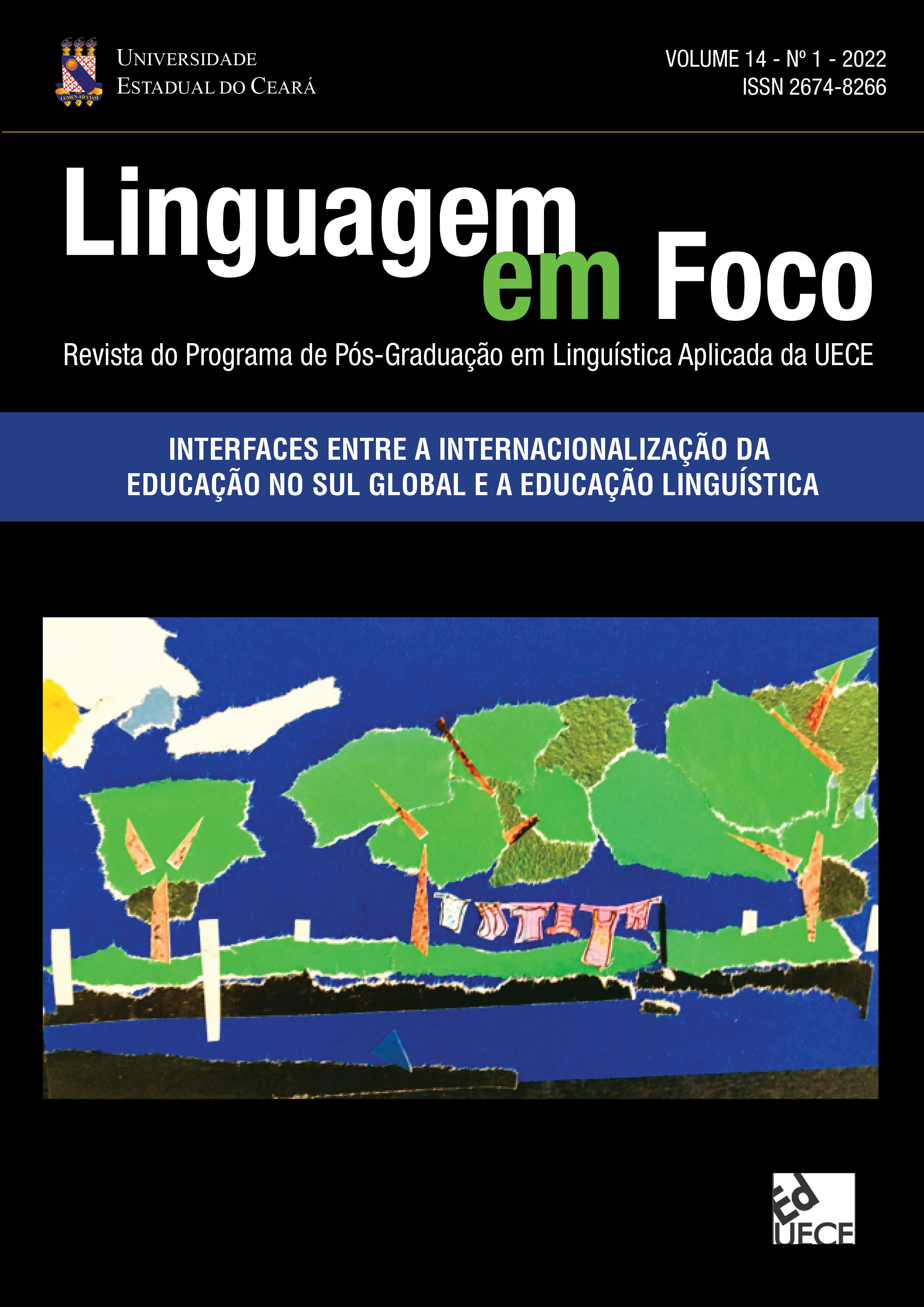“Am I American, Too?”
A Critical Analysis of Brazilian EFL Teachers’ Discourse
DOI :
https://doi.org/10.46230/2674-8266-14-8293Mots-clés :
Critical discourse studies (CDS), Teaching English as a Foreign Language, Culture, Polarization, Mental modelsRésumé
The current work is aimed at analyzing the speech of nine Brazilian teachers who teach English as a Foreign Language (EFL) for three renowned institutions of English language teaching in the city of Recife, Pernambuco, so as to verify if the mental models built justify polarization of the groups denominated as groups of US and THEM (VAN DIJK, 2015a). Such polarization has occurred in a reverse way, since Brazilian EFL teachers look up to the American culture in detriment of their own. This polarization reversal was caused in Brazil, not only by the exposure to American products, but also by the country's historical context. The influence of the American government upon Brazil, and its hegemonic power, began effectively around the 1940s, when they established a Bureau in Brazil to foster cultural exchange. Nonetheless, its creation favored the implantation of the American hegemony, which was channeled by diplomatic agreements with Brazil, which were established by the American government and materialized by institutions along with the export of its English language. This research uses a qualitative, transversal and analytical methodology and analysis was guided in the light of Critical Discourse Studies, having Van Dijk (2015a) as the main theoretician. It will support us to comprehend the socio-cognitive discourse aspects and their components, using the discourse triangle proposed by the author, discourse-cognition-society, as well as Souza (2018) and Moita Lopes (2003) among others to understand the historical context of the North American culture coming to Brazil and the mental representations built subjectively.
Téléchargements
Références
ALVES, Júlia Falivene. A Invasão Cultural Norte-Americana. Reform. São Paulo: Editora Moderna, 2004.
ASSIS, Claudete Santana de. Representação Mental da Língua e da Cultura Norte-Americanas: uma Análise Crítica do Discurso de Professores Brasileiros de Língua Inglesa. 2020. 161 f. Dissertação (Mestrado) - Programa de Pós-graduação de Ciências da Linguagem, Universidade Católica de Pernambuco, 2020.
MOITA LOPES, Luiz Paulo. “Yes, Nós Temos Bananas” ou “Chicago Não é a Paraíba Não”. Um Estudo Sobre Alienação e o Ensino de Inglês como Língua Estrangeira no Brasil. In: Oficina Linguística Aplicada a Natureza Social e Educacional dos Processos de Ensino/Aprendizagem de Línguas. São Paulo: Mercado de Letras, 2003.
MOURA, Gerson.Tio Sam Chega ao Brasil: A Penetração Cultural Americana. São Paulo: Brasiliense, 1984.
PENNYCOOK, Alastair.The Cultural Politics of English as an International Language. London: Longman Group Limited, 1994.
RODRIGUES, Nelson. À Sombra das Chuteiras Imortais. São Paulo: Cia. das Letras, 1993.
SOUZA, Jessé. A Classe Média no Espelho: Sua História, seus Sonhos e Ilusões, sua Realidade. Rio de Janeiro: Estação Brasil, 2018.
VAN DIJK, Teun A. Ideology and Discourse: A Multidisciplinary Introduction. Barcelona: Pompeu Fabra University, 2000.
VAN DIJK, Teun A. Ideology. In: The International Encyclopedia of Political Communication. New Jersey: Wiley-Blackwell, 2015a.
VAN DIJK, Teun A. Critical Discourse Studies: A Sociocognitive Approach. In: WODAK, Ruth; MEYER, Michael. (orgs.) Methods of Critical Discourse Studies. Thousand Oaks, CA: SAGE, 2015b.
VAN DIJK, Teun A. Sociocognitive Discourse Studies. In: SCHIFFRIN, Deborah; TANNEN, Deborah; HAMILTON, Heidi. Handbook of Discourse Analysis. Oxford: Blackwell Publishers, 2016.
VAN DIJK, Teun A. Discurso e Contexto: Uma abordagem sociocognitiva. São Paulo: Contexto, 2017.
VOLÓCHINOV, Valentin. Marxismo e Filosofia da Linguagem: Problemas Fundamentaisdo Método Sociológico na Ciência da Linguagem. São Paulo: Editora 34, 2017.
Téléchargements
Publiée
Comment citer
Numéro
Rubrique
Licence
(c) Tous droits réservés Claudete Santana de Assis, Antonio Henrique Coutelo de Moraes 2022

Ce travail est disponible sous la licence Creative Commons Attribution 4.0 International .
Os autores que publicam na Linguagem em Foco concordam com os seguintes termos:
- Os autores mantêm os direitos autorais e concedem à revista o direito de primeira publicação. Os artigos estão simultaneamente licenciados sob a Creative Commons Attribution License que permite a partilha do trabalho com reconhecimento da sua autoria e da publicação inicial nesta revista.
- Os conceitos emitidos em artigos assinados são de absoluta e exclusiva responsabilidade de seus autores. Para tanto, solicitamos uma Declaração de Direito Autoral, que deve ser submetido junto ao manuscrito como Documento Suplementar.
- Os autores têm autorização para disponibilizar a versão do texto publicada na Linguagem em Foco em repositórios institucionais ou outras plataformas de distribuição de trabalhos acadêmicos (ex. ResearchGate, Academia.edu).





























